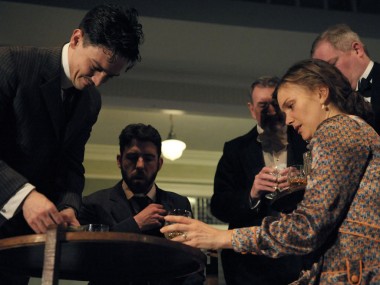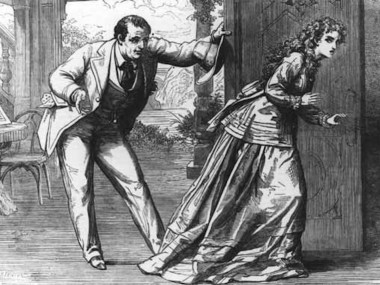A Woman Walks into a Bank, Theatre 503
Tuesday 5th December 2023

The recent news that Russia’s Supreme Court has banned the “international LGBT movement”, describing it as an “extremist organisation” and raiding nightclubs frequented by gay people, has brought this country once more to the attention of the West. But although it is easy to condemn the Russian state, for Putin’s invasion of Ukraine as well as for its homophobic policies, it is harder to understand what daily life is like in Moscow. New playwright Roxy Cook does just this with her superb debut play, A Woman Walks into a Bank, which was selected from some 1,400 submissions from 45 countries to win the 2023 Theatre 503 International Playwriting Award.
The play begins with a true story, something that happened to Cook’s grandmother (the text is dedicated to babushka). In the afterglow of the 2018 World Cup, which was remarkably “incident-free”, a very old woman walks into a bank in Moscow and is conned into taking out a high-interest loan — which, being chronically absent-minded, she immediately forgets about. She is 82 and lives alone with her 18-year-old cat, Sally. Her daughter lives abroad, phones home regularly, and when asked sends her mother money by bank transfer. But the old woman, who clearly suffers from a form of dementia, has no one to look after her on a daily basis.
When the bank loan is not repaid on time, the bank, represented here by the 25-year-old young man whose ambition is to be the branch manager and who has — in his desperation to make a sale — persuaded the old woman to sign the loan documents, hands over the debt to the Debt Collector, an older man with his own problems. When he tries to harass her to get the money back, a series of comic incidents culminates in the young man (who fancies himself as a “great man of Russia”), the Debt Collector and the old woman all meeting in her apartment on the Orthodox Church’s Christmas Eve. This bizarre climax is both tense and bleakly hilarious, its comedy emphasized by the fact that Sally the cat has been instrumental in bringing them all together.
Cook’s play feels sublime on stage because she has chosen to double her actors as three narrators — A (Old Woman), B (Young Man) and C (Debt Collector) — who tell the story at a cracking pace with a style that is beautifully incantatory and wonderfully humane. The repetitive and reiterative rhythm of the text is absolutely compelling, and the three actors also represent Sally, and this gives the story its humorous plot twists which are as surprising as any feline leap. Cook empathetically portrays the different psychologies of her characters, including the Old Woman’s memories of past regimes of Muscovite daily life, the family life of the Debt Collector and the Young Man’s mix of conformity and pleasure-seeking. Unlike the popular culture images of criminal oligarchs, murderous spies and corrupt politicians, this play focuses on the specifics of life for ordinary people.
Here the news is grim, despite the comic genre of the play — at one point, the Debt Collector offers a summary: “Russia isn’t one of those countries that holds your hand.” Oh no, you have to “fight for yourself because no one else will”. Russia is a land described as “bitter, but beautiful”, and the only safety nets are the family and neighbours. Without these, an old woman is vulnerable to exploitation not by drug gangs or mafia, but by her friendly local bank. A lot of this sounds very like life in contemporary Britain, which makes the Moscow of the play not an exotic “other” place, but an absurdist version of familiar territory.
Like Mikhail Bulgakov’s The Master and Margarita, Cook’s approach to depicting life in a hard world is occasionally both surreal and pleasurably amusing. The narration is brilliantly constructed, creating the sense of a modern folk fable in which the resignation of the characters suggests a deep melancholy as well as political apathy. Repeated details of overheated apartments, draughty stairwells and crazy traffic take centre stage, while in the distance the darkness of neo-liberal disaster capitalism looms, ready to trample any green shoots of optimism. In this atmosphere, the shrug is a common defensive response, but the joke is a kind of subversion.
Although the tragi-comic tone of the story means that the full horror of living a lonely old age in a metropolis dominated by consumer capitalism and credit culture is never fully explored, Cook directs her play with enormous theatricality, using an open set decorated by designer David Allen with a carpet pattern that evokes the old Russia, and featuring hidden panels which open to reveal a matryoshka doll (a symbol of the layered storytelling in which the mantra-like sentences are constantly both repeating themselves and revealing new features), pickle jars, family photographs and bottles of homebrew alcohol.
Cook’s production also gets excellently vivid performances by the ace cast. Giulia Innocenti’s old woman has exactly the right mixture of dread and guile, locking her door obsessively and hiding her money all over her flat, while Sam Newton’s self-regarding bank functionary is both officious and naïve. By contrast, Keith Dunphy’s Debt Collector is world-weary, sentimental and occasionally downright sinister. The performances are beguiling, and the direct address to the audience is charming as well as compelling in terms of the narrative. All in all, A Woman Walks into a Bank has the super energy of an eccentric cartoon as well as the emotional intelligence of the best new writing.
This review first appeared on The Theatre Times




